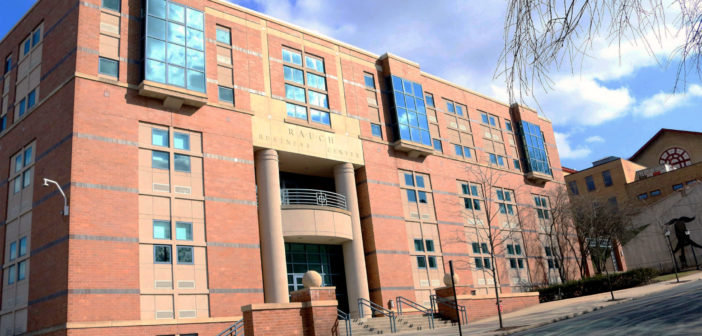The Bethlehem Bureau of Planning and Zoning granted Lehigh approval on Jan. 22 to proceed with plans to expand the College of Business.
The extension of the College of Business will be located across the street from Rauch Business Center, occupying space now used for administrative buildings and parking spaces. University Architect Brent Stringfellow said the expansion will allow for more classroom learning spaces and will serve as the home for the graduate school.
“Rauch is at and beyond capacity to the point where we had to take side areas, small storage rooms, and convert them to be used in offices in some circumstances,” Stringfellow said. “We really had to use every piece of real estate there, so this gives us some breathing room to properly reorganize the undergraduate resources.”
The first step when approaching the zoning ordinance is to understand the restraints imposed by the ordinance and see if those constraints will be met within the desired project, Stringfellow said.
Stringfellow said in the case of the Rauch expansion, there were two conditions that did not fall in line with the zoning ordinance — the projected height and the distance of the building from the street.
According to the zoning ordinance, a building on Packer Avenue must be set 20 feet back from the property line. Stringfellow said if the university complied with that ordinance, it would end up with a building only 40-50 feet wide, which is not realistic for an academic structure.
“Generally, as a district, we don’t want to put a building in that’s inappropriate to its sight,” Stringfellow said. “We don’t want something that is adverse to the neighborhood or doesn’t fit in. In this case, we believed this was not the case.”
Stringfellow said Lehigh appealed parts of the ordinance and applied for a variance, which would grant the university an exception to the zoning rules. He said Lehigh believes it is consistent with the university neighborhood to have buildings that sit directly on Packer Avenue, as many buildings already do.
Lehigh explained to the zoning hearing board how the building would have positive academic impacts and would not negatively impact the community.
Craig Peiffer, zoning officer for the City of Bethlehem, supervised the request.
“The process starts with them submitting an application for a site plan review, which goes through different city departments, including fair zoning review, zoning ordinance review,” Peiffer said. “In doing that, I prepare a letter back to them. It gets combined with everyone else’s notes to get that information, and they can either make adjustments to those plans, or in the scenario of a variance, they can seek relief from the zoning board, so they already knew the area would need relief from the zoning ordinance.”
The hearing board then granted the variance to move forward with the plans, in terms of the building height and distance from the street.
Stringfellow said the university is working towards obtaining LEED certification on the building. He said they are going to put in a green roof to help with rain water control and energy efficiency, and are using sustainably and locally-sourced materials, highly energy efficient heating and cooling systems.
“These days, zoning has gotten to the point where it determines how you can use a particular spot, and the zoning on the South Side is pretty flexible because it’s kind of in a downtown type area. So you can use buildings in pretty much any way,” said Karen Pooley, a professor of practice in political science, who teaches courses on city planning, neighborhood and housing issues.
“How you can situate them is something zoning can speak to, and then zoning is going to ask various things about building — (such as) building according to environmental standards or other kind of neighborhood-oriented standards,” she said.
Stringfellow said the process of getting a variance approved is open to the public, allowing everyone to have a voice.
During the hearing, there were no objectors to the request, granting Lehigh approval to move forward pending Peiffer’s signature to grant relief.
Pooley said she is concerned to see how the building is going to interact with the greater South Side community beyond Lehigh.
Pooley said she does not love Maginnes Hall from a planning perspective. It functions well as a campus building — possessing everything students need within it — but does not interact well with the neighborhood, acting as though its back is turned on the South Side community, she said.
“Any of these buildings going up along the edge, sort of out into the neighborhood — there are those kinds of concerns to think about at the same time,” Pooley said.
Peiffer said he believes the expansion will be a meaningful contribution to Lehigh’s campus.
“Absolutely — it’s a positive program,” he said.






Comment policy
Comments posted to The Brown and White website are reviewed by a moderator before being approved. Incendiary speech or harassing language, including comments targeted at individuals, may be deemed unacceptable and not published. Spam and other soliciting will also be declined.
The Brown and White also reserves the right to not publish entirely anonymous comments.